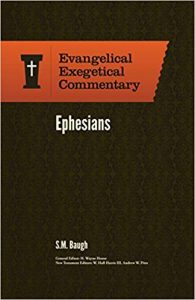 S.M. Baugh is the author of the Ephesians volume in the Evangelical Exegetical Commentary.
S.M. Baugh is the author of the Ephesians volume in the Evangelical Exegetical Commentary.
Dr. Baugh (Ph.D., University of California, Irvine) has taught Greek at Westminster Seminary California since 1983 and New Testament and Greek since 1991.
Other than his Ephesians commentary in the Evangelical Exegetical Commentary series, his other recent book is The Majesty on High: Introduction to the Kingdom of God in the New Testament.
His other writings include a commentary on the Pastoral Epistles and Philemon in the award-winning Zondervan Illustrated Bible Backgrounds Commentary, study notes on Ephesians in The ESV Study Bible, and many scholarly articles for academic journals and book collections of essays.
Dr. Baugh is a minister in the Orthodox Presbyterian Church.
7 Questions on Ephesians in the Evangelical Exegetical Commentary Series
Recently, Dr. Baugh graciously answered my questions about his Ephesians commentary.
Readers will learn how this commentary came to be, what is unique about it among Ephesians commentaries, and how the project edified him personally.
1. What previous research and/or personal interests led you to this project and helped prepare you to write this commentary on Ephesians?
I did my doctorate in ancient history studying the Apostle Paul and the city of Ephesus relating to Acts 19, soon after that I started a study guide teaching Greek from Ephesians (it’s still in my file cabinet somewhere because I eventually used First John), and I wrote the notes on Ephesians for the ESV Study Bible. This last project was so edifying to me personally that I thought it would be great to get into more depth with a commentary on this wonderful book, so I jumped at the opportunity.
2. Who is the intended audience for this commentary? Would it benefit pastors? professors? students? lay Christians in the local church?
I always write for seminary students and pastors. As a seminary professor all my adult life, these are the folk I serve. I’ve been surprised that some lay Christians are also reading this commentary, which is great, but a little unexpected! I think the appeal is obviously Ephesians itself which is such a wonderful New Testament book.
3. What is unique about this commentary? What contribution does it make to studies of Ephesians?
I had three areas to contribute to the study of Ephesians: Greek literary composition and grammar; historical background on Ephesus and the Greco-Roman world at large as it illumines the text; and, textually driven exegesis. These are all areas I’ve done lots of work on over the years in classics, ancient history, Greek grammar, theology, etc. In addition, you will notice that the first sentence introducing each section is a “thesis sentence” summarizing the passage. Commentaries tend to fragment the text into little pieces, so I was trying to always interpret the details while keeping track of the message of the larger whole.
4. What section or passage of this commentary was particularly memorable to research and write? Why?
I would have to say Eph 2:1-10 is most memorable just because it is such a powerful text. Paul really pulled out the stops here when reflecting on the wonders of the Gospel and of God’s lavish mercy and grace toward us in Christ. It’s an incredibly rich passage that draws one back again and again.
5. What personally edified you in writing this commentary, increasing your affections for Christ?
The fatherly grace of God in Christ lavished upon us through the Holy Spirit. In short, Ephesians is just soaked in the Gospel. There are times when working on this book I would have to stop and thank the Lord for the privilege of handling this rich word of grace.
6. Besides your commentary, what are your top recommended books (commentaries or otherwise) on Ephesians?
I think Charles Hodge’s commentary on Ephesians is among my favorites on the book. He was a very sensitive, careful commentator. He’s known for his systematics, but he began his career as a biblical scholar. Secondly, Clinton Arnold has several books on the ancient spiritual climate that relates to Ephesians and other New Testament books that are very perceptive about the real nature of paganism.
7. What is next for you? What project are you currently working on? How can people follow your work and ministry?
I am laying the groundwork now for a commentary on Hebrews which will undoubtedly take me many years to complete. I’ve been teaching and studying this book for 30 years already and it still fascinates me.
To follow me there is a link on our seminary’s web page:
https://wscal.edu/academics/
And Amazon:
https://www.amazon.com/-/e/
Own S.M. Baugh’s Ephesians commentary
The link provided will direct you to this volume via it’s exact ISBN number:
- Get Dr. Baugh’s commentary on Ephesians at Amazon
- Get Dr. Baugh’s commentary on Ephesians on Christian Book Distributors
Recent Posts
David Jeremiah, a renowned pastor, author, and speaker, has captivated the hearts of many with his compelling sermons. His messages resonate deeply with diverse audiences, leaving an enduring...
Tim Keller, a distinguished pastor, theologian, and author, has garnered a devoted following through the profound impact of his sermons. In this article, we will explore seven compelling reasons...
